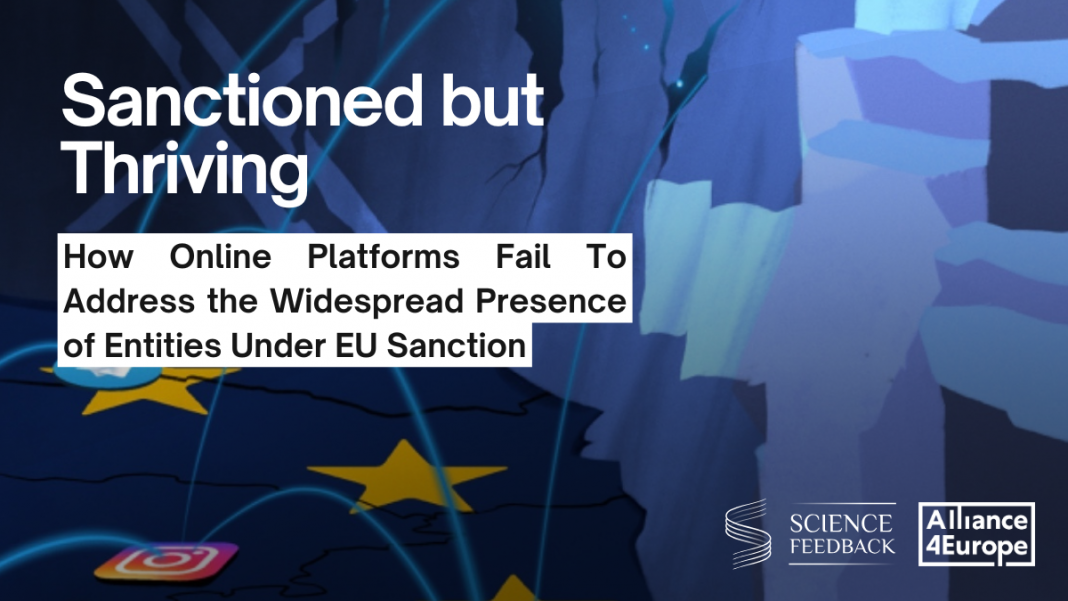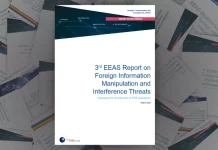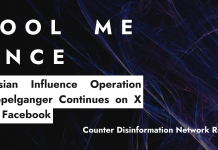Alliance4Europe and Science Feedback unveil their latest report covering the failure of Big Tech platforms to uphold EU sanctions on Russian and Belarussian propaganda actors.
This publication builds on five previous reports published in 2024, flagging the prevalence of sanctioned actors on the platforms of Meta, Google, TikTok, Telegram, and X. Those reports were provided to the platforms in question, and as we follow up with this report, we find that sanctioned content flagged to them has not been removed, with the exception of TikTok.
The report saw contributions from eight civil society organisations coordinating through the Counter Disinformation Network.
The report was created with cases contributed by Science Feedback, Alliance4Europe, Logically Facts, Alliance for Securing Democracy – German Marshall Fund, Prose Intelligence, Democracy Reporting International, Södertörn University, and the Italian Federation for Human Rights (FIDU).
Key takeaways include:
- Across platforms other than TikTok (which acted on all flags), 83% of the accounts of sanctioned entities or individuals reported remain accessible in the EU.
- 48% of the unofficial amplifiers of sanctioned content remained EU-accessible and kept on posting such content, with a further 24% having sanctioned content in their history but not posting new ones.
- Across platforms, further searches yielded 370 previously unreported new cases of official accounts of sanctioned entities or amplifiers of content from sanctioned entities being accessible in the EU.
- New sanctions-evading behaviours have been observed.
- On Belarussian-sanctioned entities and individuals, most prominent sanctioned state-owned media channels have an official, unhindered EU presence across platforms. 90 likely violations were found across these platforms.
- Many amplifier accounts, as well as a number of officially sanctioned accounts, appear to benefit from some platforms’ monetization programs, notably ad-revenue sharing (Telegram, YouTube) or subscription (Facebook).
These findings raise three questions in the EU regulatory context:
- Whether the extent to which these services acted on notices of EU illegal content meets the standards set out in the DSA
- Whether the extent to which these services prevent the dissemination of illegal content meets the risk mitigation obligations set out in the DSA (Articles 34 and 35),
- Whether these services provide economic resources to sanctioned entities, in possible contradiction with EU sanctions regulations (Art. 2 of Council Regulations No 269/2014 and No 765/2006) and their transposition at the Member State level.
This report suggests that the issue of Big Tech failing to uphold EU sanctions is pervasive and that platforms’ potential efforts to combat it are falling short. These platforms’ success in tackling copyright infringement, another type of illegal content, suggests that technical solutions do exist to ensure at-scale compliance.
“Big Tech has a clear duty to safeguard their platforms from foreign information manipulation by authoritarian governments. Every day we see how crucial this is for the safety of the democratic process across the EU. The European Commission needs to set out clear red lines for platforms to successfully implement the Digital Services Act.”
Omri Preiss, Managing director of Alliance4Europe
“Content that violates sanctions or laws is a significant concern, but equally troubling is the extensive reach such content can achieve on online platforms. While continued research into these platforms is essential, merely relying on researchers to report harmful and illegal content will not suffice.”
Charles Terroille, Writer & Analyst for Science Feedback
“This report highlights the challenges of enforcing international sanctions in the realm of information—or misinformation. The authors illuminate a key aspect of hybrid warfare: the unrestricted access to propaganda content facilitated by platforms and VPNs. The manipulation of information through TikTok and the recent cancellation of presidential elections in Romania serve as stark reminders of the power of digital-age rumours.”
Éric Percheron, associate research fellow at The French Institute for International and Strategic Affairs
This report was made possible through the Counter Disinformation Network.
The Counter Disinformation Network (CDN) is a collaborative platform that gathers more than 150 information manipulation-countering practitioners from over 30 civil society organisations, universities, news organisations, fact-checking organisations and independents mostly from Europe and North America. The network was initially convened by Alliance4Europe with the aim of protecting European democracy and information integrity. The network works to coordinate projects, respond to major events and crises, distribute research findings to actors who can use it, and facilitate exchange.
Alliance4Europe’s participation was made possible through the Information Defence Alliance project of the CDN, financed by the Ministry of Foreign Affairs of the Republic of Poland within the grant competition “Public Diplomacy 2024-2025 – the European dimension and countering disinformation. Alliance4Europe and other authors are solely responsible for the content of this report, which does not necessarily reflect the views of the Counter Disinformation Network.
The opinions expressed in this publication are those of the authors and do not reflect the views of the official positions of the Ministry of Foreign Affairs of the Republic of Poland.





